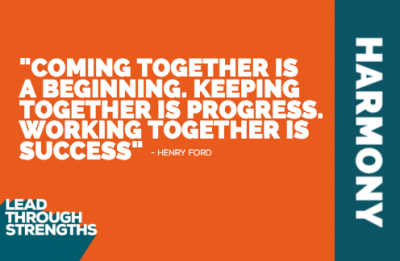Seeing Common Ground And Dying Inside When Others Won’t Try: Harmony Talent
How The Dark Side Of Harmony Plagued My Career: Harmony Talent
It took me years of practice to get to a place where I can wait before I respond to things that trip my emotional wires. When someone talks over me in a meeting, I no longer feel the need to talk louder to retake control. When someone shoots down my idea, I can listen and get curious (not always, but most of the time).

I used to jump into action when someone was upset, playing the role of peacekeeper, using my Harmony strength to find consensus and smooth ruffled feathers. This meant that no one, and I mean no one, was allowed to go to bed angry. No one was allowed to stomp off in the middle of a meeting without me trailing behind to fix him or her. No one was allowed to have a hissy fit, throw a pillow across the room, or lock themselves in the bathroom. I was right there asking if you were okay and trying to fix it.
You may be a natural peacekeeper, like me. You may be a middle child, or a child whose parents went through a divisive divorce, or have Harmony at the top of your list of StrengthsFinder talent themes. I have the latter two.
Although I lean toward natural Harmony, I learned to harness it so I could use it to build consensus yet not be a slave to other people’s emotions. That's exactly why it makes sense to harness your peacekeeping talent for good. Rather than letting it own your emotions, if you invest in it, you can use it at work to get results. You'll be able to see common ground while the rest of the team is too busy fighting about their differences. They are often blind to what you can see.
2 Reasons Why You Need To Invest In Your StrengthsFinder Talent of Harmony
1. Because the world needs peacekeepers.
The peacekeeper is the one who glues the team together. She’s able to find consensus. She can take disparate views and put them into a pros/cons list or compare/contrast list or before/after list. When people speak up, disagree, dismiss, and disregard ideas - when we talk over one another, interrupt, and interrogate, she is still able to make a list of pros and cons.
She may also be the one who cannot stand to go to bed angry. Avoid personal confrontation at all costs. She might be the one so uncomfortable with unease on the team that she has to leave the room. She’s the one who would rather jump in front of a bullet than think someone is unhappy with her.
2. Because you'll either be a slave to other people’s emotions or you'll learn to harness your power for good.
If you lead through Harmony, responding rather than reacting to conflict does take quite a bit of self control. Peacekeepers are great at controlling what they think, but they don’t get that way by just showing up. They train, they practice, they plan. Here's an example at work:
![[an obviously photoshopped image of melissa's head in a swirl of fire] Melissa's depiction of how she feels when her head is on fire from a lack of Harmony - when her StrengthsFinder talent theme of harmony is being insulted or pressured](http://melissahereford.com/wp-content/uploads/Hair-on-fire-e1493660576580.png)
Melissa's depiction of how she feels when her head is on fire from a lack of Harmony at the office
"I don’t like that idea"
"I don’t think that will work"
"That will never go over with customers"
"We could never do that"
"No no no no no"
Any time you hear no, you can think of it as a tomato thrown at your efforts and take it personally OR you can be a peacekeeper, step back, and look at it objectively.
I imagine the fire safety public service announcements when I’m in these situations, trying to stay calm even though my head is on fire with emotions.
Action Ideas For Using Your StrengthsFinder Talent Theme of Harmony
- Stop your emotional reaction by taking a deep breath. I’ll be honest, this may be the hardest thing you ever learn to do. It's also one of the most gratifying. If you can learn to quiet the emergency alarm bells in your head, you will be heard in a totally different way. Instead of being reactionary, you’ll be recognized for keeping a cool head under pressure.
- Drop your defenses. Instead of getting defensive and responding with a list of reasons why you’re right, or talking louder—get curious. Ask a question. Try to really understand what’s going on.
- Roll toward a more intentional response. Choose how to respond: Will you stand firm and respond with a clear statement? Or will you get curious and ask a question?
Note: This article originally appeared on Melissa's Connector Conversations Blog. If you liked this story, also check out her article on her StrengthsFinder talent theme of Communication. In her Communication strength, she figured out how to make a bad performance review a good thing. Sounds crazy, yet she did it!
I’ve been helping business professionals have more connected conversations for more than 22 years. I’ve worked in learning and development as a trainer, a curriculum designer, and a sales enablement leader. Today, I’m helping people have confident, clear and connected conversations at MelissaHereford.com.
I’ve created and customized classes for people all over the world, with one outcome in mind: making your life better through conversations. My Top 5 StrengthsFinder Talent Themes are Input, Communication, Harmony, Adaptability, and Woo.

